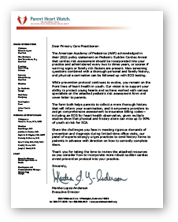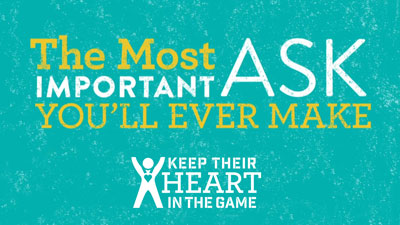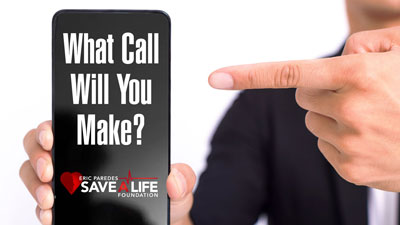How can we prevent SCA?
What we don’t say puts them at risk…
what we don’t know could kill them.
Weekly headlines report the shocking incidence of Sudden Cardiac Arrest (SCA) at home, in school and on the field. Children, teens and young adults are dying from an outcome that could be prevented. One approach to changing this paradigm is through thoughtful cardiac risk assessments by parents, sports programs and medical professionals.
1 in 300
Youth has an undetected heart condition
Up to 72%
Had unrecognized warning sign
Up to 60%
Have a significant family heart history
Up to 60%
Victims with symptoms not recognized as cardiac related
Warning signs and risk factors often go unrecognized and reported because youth aren’t asked about them, and families don’t provide a comprehensive family heart history annually to their medical practitioner. You can take a cardiac risk assessment at home and share your findings with your doctor.
- Download the Cardiac Risk Assessment Form
- Talk with extended family members to get a complete heart history (grandparents, aunts, uncles, cousins, mom, dad, siblings)
- Complete the form with your youth, explaining warning signs and asking them if they’ve experienced symptoms
- Take the form to your youth’s next checkup, or if the youth is experiencing symptoms, or your doctor is not aware of significant family heart history, make an appointment for a checkup
For the latest information on Cardiac Risk Assessment During COVID, learn more here.
Warning Signs of a Potential Heart Condition
- fainting or seizure, especially during or right after exercise
- fainting repeatedly or with excitement or startle
- racing heart or irregular heartbeat
- dizziness or lightheadedness
- chest pain or discomfort with exercise
- excessive shortness of breath during exercise
- excessive, unexpected fatigue during or after exercise
Factors that Increase Risk of
Sudden Cardiac Arrest
- family history of known heart abnormalities or sudden death before age 40
- specific family history of Long QT Syndrome, Brugada Syndrome, Hypertrophic Cardiomyopathy, or Arrhythmogenic Right Ventricular Dysplasia (ARVD)
- family members with unexplained fainting, seizures, near/drowning or car accidents
- known structural heart abnormality, repaired or unrepaired
- recreational use of stimulants, inhalants, unprescribed medication, performance-enhancing supplements or energy drinks read more
Why Warning Signs Get Missed
We live in a very competitive world, and kids are daily encouraged to rise to the challenge. Young people often don’t tell adults if they experience symptoms, and parents often urge their kids to play hard and be tough.
- Student athletes (and often their parents) don’t want to jeopardize their playing time, so they may avoid telling parents or coaches in hopes that the symptoms will “just go away.”
- Kids may be embarrassed they can’t keep up, thinking they’re out of shape and just need to train harder.
- Having felt this way all their life, they may be unaware that what they are feeling is not normal and indicates a potentially fatal condition.
- There is not enough dialogue and education in parent, school, sports and medical communities about warning signs and how to recognize them.
We need to let our kids know that if they experience any of the above symptoms, it is crucial to alert an adult and get follow-up care right away with an appropriate physician. Additionally, if the youth has any of the SCA risk factors, these should also be immediately discussed with a doctor to determine if a heart screening is needed.
Prevention Tools
Download this Cardiac Risk Assessment Form and bring them to your well-child exams and pre-participation sports physicals. Or, if you check “yes” or “unsure” to any questions, make an appointment with your medical practitioner to review..
You can also take our online cardiac risk assessment and get a PDF emailed to you.




